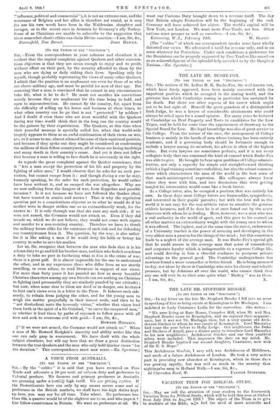[TO THE EDITOR OF THE "SPECTATOR."'
SIR,—From the correspondence in your columns and elsewhere it is evident that the capital complaint against Quakers and other conscien- tious objectors is that they are mean enough to enjoy and to profit, without effort on their part, by the security afforded to them by the men who are dying or daily risking their lives. Speaking only for myself, though probably representing the views of many other Quakers, I admit that the position is an unpleasant one even for those of us who arc above military age, and must be painful for men of that age. But assuming that a man is convinced that he cannot in any circumstances take life, what is he to do ? He must not sacrifice his convictions merely because they are unpleasant for the time being to hold, and open to misconstruction. He cannot fly the country, for, apart from the difficulty of selling up his house and business at these times, to what other country can he go that is not " protected " by soldiers ? And I doubt if even those who are most wrathful with the Quakers during war time would think that in the long run the country would be the gainers by their expatriation. The Quakers, at this time when their peaceful message is specially called for, when this world-wide tragedy appears to them as an awful confirmation of their views on war, arc, as it seems to me, almost silenced because of their equivocal position, and because if they spoke out they might be considered as condemning the millions of their fellow-countrymen, all of whom are facing hardships and many death in their country's cause. And yet it does not follow that because a man is willing to face death he is necessarily in the right.
As regards the great complaint against the Quaker conscience, that it "lets a man accept the protection of his life and property by the fighting of other men," I would observe that he asks for no such pro- tection, but cannot escape from it ; and though during a war he may, humanly speaking, be the safer for such protection, he would rather have been without it, and so escaped the war altogether. Why are we now suffering from the dangers of war, from Zeppelins and possible invasion ? Is it not because we have not followed the Quaker ideal, but have trusted in armies and navies ? That is why the regulation question put to a conscientious objector as to what he would do if his mother were in danger strikes one as so extraordinarily weak, for the answer is ; It is only through war that she runs any such risk ; if we were not armed, the Germans would not attack us. Even if they did invade us, which we do not believe, they would not come with rapine and murder to a non-resisting country. Therefore we have to thank the military forces alike for the existence of such risk and for defending our countrywomen from it. The question, by the way, is also unfair for it is like asking a man if he would deny his faith or betray his country in order to save his mother.
Let us, Sir, recognize that between the man who feels that it is his solemn duty to go and kill his brother-man, and him who feels it as solemn a duty to take no part in furthering what to him is the crime of war, there is a great gulf. It is almost impossible for the one to understand the other, and in my experience those who differ from us are mostly unwilling, or even refuse, to read literature in support of our views. For more than forty years it ha3 puzzled me how so many beautiful Christian characters among my own friends can see nothing un-Christian in fighting (and presumably they are similarly puzzled by our attitude) ; but now, when some dear to them are dead or in danger, one hesitates to hint one's views even in a letter to the Press. It behoves each side surely, to refrain from judging the other, and for the young men to weigh the matter prayerfully in their inmost souls, and then to be "not disobedient unto the heavenly vision," whether that vision lead them forth in the spirit of a Sir Galahad, "to carve the casques of men," or whether it lead them by paths of reproach to follow peace with all men and seek to overcome evil with good.—I am, Sir, &c.,
HOWARD HODGKIN.
[" If we were not armed, the Germans would not attack us." When a man of Mr. Howard Hodgkin's sincerity and ability writes like this one can only gasp in amazement. We have dealt with the whole subject elsewhere, but will say here that we draw a great distinction between the true Quakers and the men who only hold Quaker views "for the duration." This correspondence must now cease.—En. Spectator.]


































 Previous page
Previous page